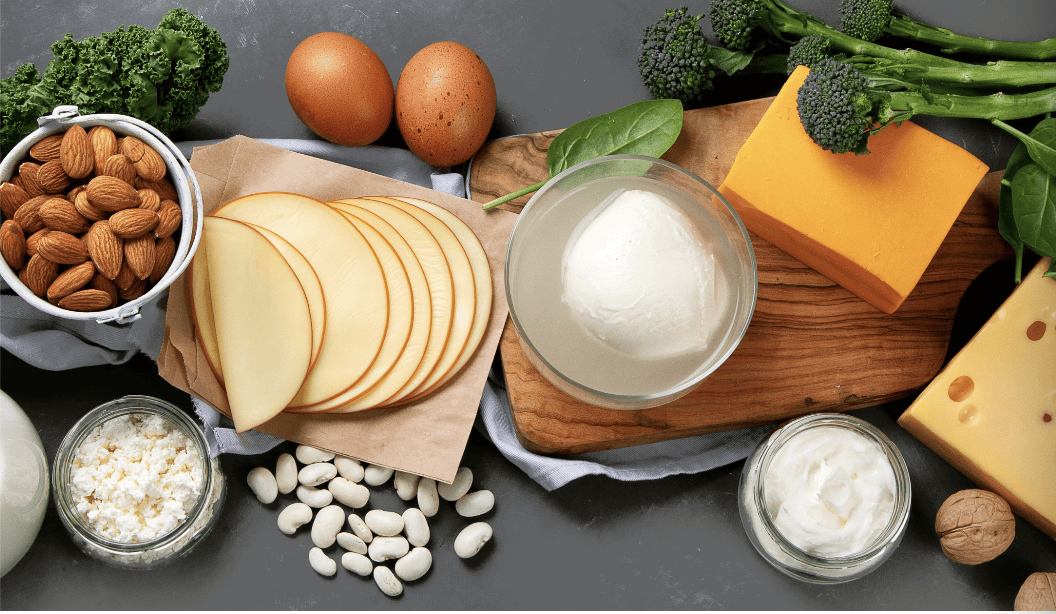Boost Your Bone Health With Calcium-Rich Foods: A Guide to a Strong and Healthy Skeleton
Calcium is a vital mineral that plays a crucial role in maintaining the strength and health of our bones. Think about bones as the framework of the body – supporting daily movement and physical activity. Bones can become weak and fragile as we age, increasing the risk of fractures and breaks. That’s why it’s essential to make sure we get enough calcium through the food in our diets. Food is an essential source of calcium to help ensure our bones remain healthy and strong, because our bodies cannot produce calcium on its own.
Whether you’re a growing child, a young adult, or a senior, your bones need a steady supply of calcium to stay strong and healthy.
What is Calcium and Why Do Our Bodies Need it?
Calcium is a vital mineral for our overall health and wellness, but especially for our bones. Bones are essentially a storehouse for calcium, with a constant flow of the mineral moving in and out of the bones as needed by the body. This process helps to keep our bones strong and healthy, allowing them to support our bodies and protect our vital organs. When the body doesn’t get enough calcium from the diet, it will take it from the bones, which can lead to problems like osteoporosis and other bone disorders.
As we age, our bones can become weaker and more fragile, which can lead to a higher risk of fractures and other bone injuries. Consuming a diet that is high in calcium-rich foods can help allow our bones to maintain their strength and structure. In addition to increasing calcium intake, increasing vitamin D can help the body absorb calcium better from the diet. Performing weight-bearing exercises such as walking and low-impact aerobics can also help strengthen bones and keep them healthy.
Foods High in Calcium
Now that we understand the importance of calcium, it’s time to focus on the foods that can provide us with this essential mineral. Whether you’re a meat-eater, vegetarian, or follow a plant-based diet, there are plenty of options out there for you to choose from. So, let’s dive in.
Dairy
Dairy products are some of the most calcium-rich foods that exist. This is because dairy is made from the milk of animals, which is naturally high in calcium. This mineral is essential for the growth and development of bones, as well as for maintaining their strength and density over time. The calcium found in dairy is easily absorbed by the body, making it a highly bioavailable source of this important mineral.
Dairy products come in many different forms. Some of the most commonly consumed dairy foods include milk, cheese, yogurt, and cottage cheese. Each of these products can provide the body with substantial amounts of calcium, making them an excellent choice. Milk is one of the best sources of calcium available, containing about 300 milligrams of calcium per 8-ounce serving.
Note: Yogurt can be a great alternative for those who struggle with lactose intolerance as it contains good bacteria that helps break down lactose, making it easier to digest.
Plant-Based Calcium
For those who are lactose intolerant or prefer not to consume dairy, many non-dairy milks, such as soy and almond milk, are often fortified with calcium, making them a convenient and nutritious alternative to dairy milk. Plant-based yogurts can also be a good option depending on the brand. The amount of calcium in these plant-based alternatives can vary, therefore, it is important to check the label to see exactly how much calcium is added to each serving.
Tofu and leafy greens are vegan-friendly options that can be incorporated in many dishes to help boost the mineral. Overall, with a little bit of research and label reading, it is possible to find a variety of plant-based sources of calcium to incorporate into your diet.
Chia Seeds
Chia seeds are often overlooked for their calcium content, though they provide a notable amount. Chia seeds are also a good source of healthy fats, which have numerous health benefits. One tablespoon of chia seeds contains about 75 milligrams of calcium. Adding that to smoothies or sprinkling them on a salad is a great way to boost meals with calcium.
Beans
Another great option for getting extra calcium is beans. However, not all beans are equal in terms of calcium content. Fresh soybeans (edamame), white beans, and navy beans are all great sources, with navy beans having the highest source of calcium.
Leafy Greens
While leafy greens are also a good option, it’s important to understand that they contain oxalates, which can make the calcium in them less easily absorbed by the body. Typically, one serving of leafy greens provides around 200 milligrams max of calcium, however, it’s important to remember that you need more than just a cup of kale to meet your daily calcium needs. For the best results, choose cooked leafy greens such as kale or collard greens, as they have a higher amount of calcium and fewer oxalates that could reduce absorption.
Almonds
In addition to calcium, almonds are also a good source of other essential nutrients such as healthy fats, fiber, and protein. Almonds can be eaten on their own as a snack, added to smoothies or yogurt, or used as a topping for salads and other dishes.
A Healthy Skeleton
Calcium is a cornerstone for our bone health and overall wellbeing. Incorporating calcium-rich foods like dairy, plant-based alternatives, beans, greens, and nuts and seeds can help meet our daily needs. However, it’s not just about calcium. A balanced diet, physical activity, and adequate vitamin D levels are also crucial in supporting bone health. With the role that bones play in our daily lives, taking care of them should be a priority.
—
Disclaimer: This Website and Fresh Tri™ Do Not Provide Medical Advice. All content provided on this website and in Fresh Tri app, including text, images, audio, video, graphics and other material are for informational purposes only. No material on this site or in Fresh Tri is intended to be a substitute for professional medical advice, diagnosis or treatment. Always seek the advice of your physician or other qualified healthcare provider with any questions you may have regarding a medical condition or treatment and before undertaking a new health care regimen, including any weight loss program. Never disregard professional medical advice or delay in seeking it because of any information you saw or heard on this website or within Fresh Tri.













